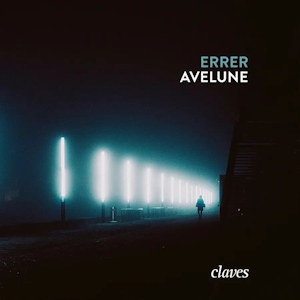
Emma Thomazeau (b. 1999)/Baptiste Baudimant (b. 1999)
Errer (Wandering)
Avelune
rec. 2024, Utopia 1, Haute Ecole de Musique (HEMU), Lausanne, Switzerland
Claves CD3100 [48]
Harpist Emma Thomazeau and trombonist Baptiste Baudimant first met in 2020 as members of the French National Youth Orchestra and promptly formed a duo, Avelune. Harp and trombone seem to constitute an unlikely combo; Avelune’s magpie approach to arranging and recording incorporates elements of electronics, recitation, poetry, pop and Latino, as well as hints of minimalism and microtonality. Beyond the briefest of biographies, and a paragraph framing their modus operandi in a contemporary argot which references “(an) inner and celestial journey”, and the album representing the “meeting point for all our ideas” and being “the frozen entity of our constantly moving musical desires”, the documentation provides few clues; the most notable is the reference to Errances (Wanderings), a poem by Caroline Despont whose words and phrases provide landmarks which might support listeners as they navigate the music. Or not.
Attractive roulades of harp in an immersive halo of electronic ambience and birdsong pervade a brief Ouverture. Emersion is akin to waking up and walking bleary-eyed into the crisp spring air. Electronic percussion and harp provide a pleasant soundscape, but whilst Thomazeau is clearly a skilful practitioner and Baudimant evidently expert in a studio environment, it’s all rather superficial and ‘new-agey’. The (French) text of Despont’s poem comes to the fore in Errances I. Thomazeau’s evocative, expressive recitation invokes different forms of transportation and landscape but I think the text is alluding to states of daydreaming implied by the elusive, semi-formed soundscape pulsing underneath the words. I certainly found myself drifting off.
The longest movement Pluie d’été (Summer Rain) follows. Atmospheric droplets of harp and field recordings introduce a plaintive yet chocolate-smooth trombone solo. At this point, Badimant’s instrument takes more of a lead in the project. In this case, it yields to another pleasant episode enhanced by an eerie whistling timbre. A sequence of tiny episodes reference rock, Latino rhythms and Jean-Michel Jarre. The diverse styles and beats fit surprisingly well, yet there’s nothing remotely challenging about this music – and therein lies my problem. Ultimately it projects as synthetic and studio-bound. It might provide a decent soundtrack for a documentary about climate change or topography but no matter how cleverly arranged and cleanly produced it is, to my ears Errer lacks soul, sweat and notwithstanding the overt influence of Despont’s poem on the concept and its execution, humanity.
So the remaining seven sections play out and fade. Time passes, the word ‘nice’ pops into and out of one’s head, as does the thought that this reviewer is most unlikely to repeat the experience at any point in his life. In fact one is struck by how the labels applied by these young players to each movement could be randomly generated. The track titles are so neutral they could be interchangeable. The music is pretty for sure; it’s also stubbornly banal and insubstantial. The seventh section Réflexion was trailed by Claves as a teaser for the album, but apart from the odd grandiose chord, it’s indistinguishable from the rest of Errer.
I specifically requested this disc to review as a few months ago I heard a 2013 recording of Simeon Ten Holt’s ubiquitous minimalist behemoth Canto Ostinato in an iteration for harp and electronics(Etcetera – KTD 5007). Notwithstanding the unremitting variation and repetition of its familiar (and arguably predictable) melodic and harmonic DNA, I am not ashamed to admit that it literally moved me to tears. I have little understanding of the mysterious alchemy at play here, but I’m afraid that Errer had precisely the opposite effect. Could it be that lack of ‘soul’ I mentioned earlier? Whatever the reason, Emma Thomazeau and Baptiste Baudimant are undoubtedly a talented pair, and I guarantee that being in their mid-twenties they will make a more vital, lasting mark in the musical firmament of the future than they have achieved with this glossy, maddeningly superficial affair.
Having said that of course, others might respond entirely differently. If that turns out to be the case, I hope they will forgive this possibly ill-advised judgment of Errer.
Richard Hanlon
Buying this recording via a link below generates revenue for MWI, which helps the site remain free


Contents
Ouverture (Overture)
Emersion (Emergence)
Errance I (Wandering I)
Pluie d’été (Summer Rain)
Rémanence (Afterglow)
Errance II (Wandering II)
Réflexion (Reflection)
Comète (Comet)
Errance III (Wandering III)
Éclat (Brightness)
Cérès (Ceres)
















